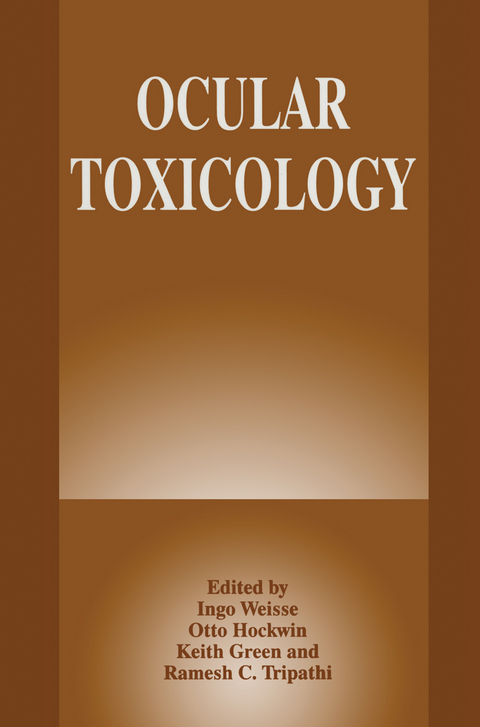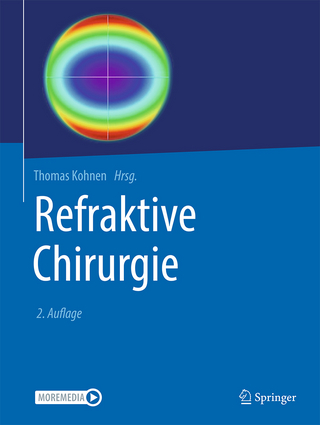
Ocular Toxicology
Springer-Verlag New York Inc.
978-1-4613-5769-8 (ISBN)
Welcome and Opening of the Congress.- A. Ocular Electrophysiology.- The ERG, EOG, and VEP in rats.- Retinal toxicology study using electrophysiological methods in rabbits.- ERG measurements in the dog, cat and monkey for toxicology specially type of electrode and anesthesia for ERG recordings.- Electroretinography in the non-human primate as a standardized method in toxicology.- Effects of clindamycin on neural function in the isolated perfused vertebrate retina.- Determination of the effect of ketamine, thiopental and halothane on the ocular electroretinographic examination of the beagle dog to define protocols to be used in dogs, monkeys and micropigs.- Experimental study of the retinal toxicity of iron after vitreous hemorrhage.- Retinal tolerance of intravitreal low-molecular-weight heparin, colchicine or interferon ß determined by eye-cup ERG in albino rabbits.- Normal ERG on rhesus monkeys (Macaca mulatta): Preliminary results of a technic using subcutaneous electrodes.- Effects of quinine on the electroretinogram of the beagle dog.- B. Ocular Pharmacokinetics.- Effect of different vehicles on ocular kinetics/distribution.- Drug distribution studies in single lens layers through the application of a sectioning technique.- Ocular pharmacokinetics of some proteolytic drugs in the course of topical application: Long-term observation.- New method of the reverse intraarterial drug infusion into final periorbital channels of the ophthalmic artery in urgent treatment of toxic opticneuropathy.- Evaluation of the effect of the vehicle on ocular distribution and bioavailability of Betaxolol.- Continuous flow contact lens delivery of diclofenac to rabbit cornea and aqueous humor.- One-year ocular toxicity study of ofloxacin ophthalmic solution in beagle dogs.- Topicalfluconazole: High penetration without corneal toxicity.- C. Lens/Cataract.- Relevance of cataract models in rodents as a tool to evidence a co- or syncataractogenic potential of drugs in preclinical studies.- Influence of PHAKANR on the lens toxicity of naphthalene in rat lenses, analyzed by isoelectric focusing of single lens layers.- Investigations into the cataractogenic potency of a non-tricyclic antidepressant.- Comparative investigations on the cataratogenic effect of a triazin-derivative in albino and pigmented rats: I. effects detected with a slit lamp.- Regionality of glycated calf lens crystallin subunits demonstrated by lectin staining.- Spatial distribution of adenosin nucleotides in lenses of species with different accommodative capacities.- Hyperbaric oxygen therapy induces a lenticular myopic shift even with shorter treatment protocol: A preliminary report.- Posterior subcapsular cataracts and raised intraocular pressure are caused by prolonged oral corticosteroid therapy in adutt patients with inflammatory bowel disease.- D. In Vitro Methods.- In vitro methods in ocular toxicology: Introductory remarks.- (3H)-arachidonic acid release as an alternative for the eye irritation test.- Cytotoxic effects of antifungal drugs on cultured human conjunctival cells.- Characterization of sialomucins expressed by human conjuctival goblet cells.- E. Regulatory Affairs.- Critical evaluation of the evidence for an association between ocular disease and exposure to organophosphorus compounds.- A practical testing strategy for the evaluation of the oculotoxic potential of chemicals.- F. Miscellaneous.- Aesthesiometry-azelastine eye drops reduce corneal sensitivity in rabbits, but not in dogs and humans.- Influence of chronic alcoholic intoxication on healing of corneal epithelial defects. Effectivity of treatment by protease inhibitor contrycal (aprotinin) and autologous fibronectin.- The use of cyclosporine A in veterinary ophthalmology.- Characterization of human tear glycoproteins by phast SDS electrophoresis, western blotting and lectin binding.- The corneal effects of 2-(2-nitro-4-trifluoromethyl-bencoyl)-cyclohexane 1,3 dione (NTBC) in the rat.- Exacerbation of spontaneous rat corneal opacities in a polymorphonuclear elastase inhibitor toxicity study.- The comet assay: A reliable and sensitive method for the documentation of UV-B induced DNA damage.- Spontaneous ocular findings and esthesiometry/tonometry measurement in the Göttingen minipig (conventional and microbiologically defined).- Measurement of intraocular pressure in cynomolgus monkeys using a TonopenR.- Lead-intoxication of dopaminergic cells in the retina.
| Zusatzinfo | X, 378 p. |
|---|---|
| Verlagsort | New York, NY |
| Sprache | englisch |
| Maße | 155 x 235 mm |
| Themenwelt | Medizin / Pharmazie ► Medizinische Fachgebiete ► Augenheilkunde |
| Medizin / Pharmazie ► Medizinische Fachgebiete ► Pharmakologie / Pharmakotherapie | |
| Naturwissenschaften ► Biologie ► Botanik | |
| Naturwissenschaften ► Biologie ► Zoologie | |
| ISBN-10 | 1-4613-5769-1 / 1461357691 |
| ISBN-13 | 978-1-4613-5769-8 / 9781461357698 |
| Zustand | Neuware |
| Haben Sie eine Frage zum Produkt? |
aus dem Bereich


